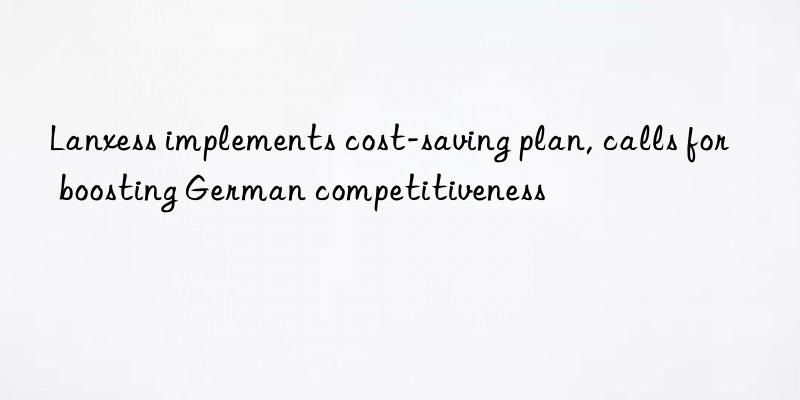
LANXESS' business figures for the second quarter were again impacted by weak global demand in many customer industries: Sales of 1.778 billion euros were down 11.1 percent compared to the 1.999 billion euros recorded in the same period last year. Earnings before interest, taxes, depreciation and amortization (EBITDA) fell by 57.7% from 253 million euros to 107 million euros. For the full year 2023, LANXESS expects earnings before interest, tax, depreciation and amortization (EBITDA) to be between 600 million euros and 650 million euros. Accordingly, the Group confirms the interim guidance for the second quarter and full year 2023 issued on June 19.
The negative earnings growth was due to continued weak demand from many customer industries, customers' ongoing inventory reductions and lower selling prices. China, the world's largest chemicals market, also failed to stimulate demand. Only the consumer protection business posted sales growth. The contribution of the microbial control business acquired from IFF in early July 2022 has a positive impact here.
The Group's EBITDA margin was 6.0 percent, compared with 12.7 percent in the same period last year. Net income from continuing operations fell to -145 million euros in the second quarter from 48 million euros a year earlier.
Matthias Zachert, Chairman of the Management Board of the LANXESS Group: "The chemical industry and LANXESS are currently experiencing difficult times. There are currently no signs of a recovery in demand in the second half of the year. We are therefore responding: with our "FORWARD!" action plan , we will stabilize our earnings in the short term, reduce our costs in the long term, and improve our structures and processes. When the economy picks up again, we hope to get back on track quickly. But it is not enough, politicians need Final awakening. In the current phase of economic weakness, Germany is not internationally competitive. We urgently need sustainable framework conditions – above all internationally competitive electricity prices for industry, reducing excessive bureaucracy and speeding up approval procedures".
" FORWARD!" action plan
The "FORWARD!" action plan is divided into three parts. First, LANXESS took immediate steps to quickly stabilize earnings for the current financial year. These include tight cost controls in all areas and a Europe-wide hiring freeze. This will result in one-time savings of 100 million euros, half of which will come from cost cutting and half from reduced investment.
Through a package of structural measures, the Group intends to increase efficiency in the long-term and reduce costs by 150 million euros per year. These measures will be implemented successively and will take full effect from 2025. LANXESS expects the one-time costs of implementing the measures to be around 100 million euros. The focus is on analyzing energy-intensive operations in global factories and facilities and streamlining administrative structures.
Among the production facilities in Germany, the action plan is mainly focused on the Krefeld-Uhldingen production site: The oxidation of hexane at this production site is very energy-intensive and will be closed in 2026. The production site's chromium oxide production facilities will be sold. If a sale is not possible, LANXESS will also consider closing the facility.
The third part of the action plan is to further refine the business model. Matthias Zachert said: "In recent years, LANXESS has continuously adjusted its product portfolio towards specialty chemicals and has achieved leading market positions in many areas. Now is the time to realize the full potential of the new business. In addition, we also Hope to further expand the range of sustainable products."
drastically reduce debt
LANXESS significantly reduced its debt in the second quarter. Net financial liabilities decreased by 24.9% from EUR 3,814 million on December 31, 2022 to EUR 2,863 million on June 30, 2023. The decrease was primarily due to the receipt of payments related to the establishment of the Envalior joint venture. As of April 1 this year, LANXESS has established a joint venture with private equity investor Advent Capital, invested its high-performance materials business unit in it, and obtained about 1.27 billion euros in investment returns from Advent Capital.
Market Segments: Demand is subdued in almost all sectors
The integration of the Microbial Control business acquired on July 1, 2022 contributed significantly to sales in the Consumer Protection business in the second quarter of 2023. Sales rose 8.2 percent to 604 million euros from 558 million euros a year earlier. However, lower selling prices and volumes had the opposite effect. As a result, earnings before interest, taxes, depreciation and amortization (EBITDA) before special charges amounted to EUR 82 million, down 8.9 percent compared to EUR 90 million in the same period last year. EBITDA margin was 13.6%, compared with 16.1% in the same period last year.
Weak demand, especially from the construction and electronics industries, had a negative impact on sales and earnings in the Specialty Additives business unit. Sales in the second quarter of 2023 amounted to EUR 620 million, down 18.8% compared to EUR 764 million in the same period last year. The second quarter of this yearEarnings before interest, taxes, depreciation and amortization (EBITDA) were EUR 37 million, a significant decrease of 72.4% compared to EUR 134 million in the same period last year. The EBITDA margin before special circumstances fell to 6.0 percent from 17.5 percent in the same period last year.
Lower selling prices and volumes had a negative impact on the performance of the Advanced Intermediates business unit. Demand from the construction and chemical industries was particularly weak. Sales in the second quarter of 2023 were EUR 484 million, a decrease of 17.5% compared to EUR 587 million in the same period last year. Earnings before interest, taxes, depreciation and amortization (EBITDA) before special circumstances fell by 68.9% to 23 million euros from 74 million euros in the same period last year. The EBITDA margin before special charges fell to 4.8 percent from 12.6 percent a year earlier.



 微信扫一扫打赏
微信扫一扫打赏
